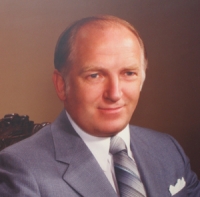
While Ross McCreath's career in broadcasting justly earned him many accolades and awards, his greatest contribution to the industry came after his retirement. His work as president of the non-profit Canadian Communications Foundation (CCF) was the driving force that gave the nation the definitive History of Canadian Broadcasting that can be found online at www.broadcasting-history.ca. McCreath died on October 7th 2014 at the age of 90.
He was born in Toronto on January 23rd 1924, and was educated at Whitney and Blythwood public schools. He then went to Lawrence Park Collegiate, but left before graduating to join the Toronto Star as a copy boy in 1939, the year World War II began. By 1942, he was old enough to volunteer for the army, and served with the Army Show on the production side for three years in Canada, the U.K., France, Belgium and Holland.
On his return to Canada in January 1946, and having got the ‘theatre bug', McCreath decided advertising was the closest thing to showbiz in the media field, and got a job at Spitzer and Mills' radio department as a buyer.
In 1949, he moved to the sales representation firm of All-Canada Radio Facilities and when private television came along, he played a key role in helping All-Canada to establish its television division and in 1955, he was appointed national sales manager, He became vice-president – television in 1959.
In 1966, McCreath was appointed vice-president and general manager of All-Canada Radio & Television, and by 1972 he had become president. Selkirk Holdings, the parent company of All-Canada, made its mark in the UK in 1974 with the advent of commercial radio there, and he was responsible for setting up radio sales and marketing in London, to act as sales agents for LBC and other new UK radio stations.
McCreath was a director of the Broadcast Executives' Society from 1968 to 1974, and president of the Canadian Association of Broadcast Representatives, 1968-74 and 1982-83. He had two eight-year spans as a director of the Bureau of Broadcast Measurement (BBM ),which he chaired for two years; he also sat for ten years (1967-77) on the board – two of them as chairman – of the Television Bureau of Advertising (TVB), and for six years (1980-86) on the Board of the Radio Bureau of Canada, which he chaired from 1983-86. In 1982, he chaired the Planning Committee for the first ever joint convention of the Canadian Association of Broadcasters, the Central Canada Broadcasters' Association and the Central Canada Broadcast Engineers.
In 1967, the CAB had established The Canadian Communications Foundation, with an initial investment of $25,000. Its mission was to "commemorate throughout Canada the development of electronic communications". But it was to be another 20 years before, under McCreath's leadership, the CCF began to gather material that would preserve Canada's broadcasting history in a practical way.
He proved to be the ideal man to lead this project. As a sales executive based in Toronto, he had served the Canadian broadcasting industry with distinction on dozens of Committees or projects that involved the CAB. He knew virtually everybody that owned or operated radio and TV stations coast-to-coast, as well as having had frequent dealings with national advertisers and regulators.
In 1987, when he started a two-year term as president of the Canadian Communications Foundation, McCreath implemented an ambitious project to tape interviews with both retired and active broadcasters who had helped to shape Canada's broadcast industry. Over eighteen months, some 150 such interviews were recorded and deposited in the National Archives in Ottawa.
McCreath retired in 1989, completing 40 years with All-Canada/Selkirk and his tireless work for the industry earned him the Ruth Hancock "Friend of the Industry" Memorial Award in 1979, and in 1987 the Association of Canadian Advertisers honoured him with its Gold Medal Award. He was one of only five broadcasters to have been so recognized in the then 54 year history of the Award.
By the time McCreath retired in 1989, the CCF had become comparatively dormant, but he had kept copies of those interview tapes. Then, in 1994, in search of a place for a site to deposit them for future public access, he talked to professor Jon Keeble at Ryerson University who suggested rather than trying to establish any form of museum, CCF should consider starting a website on Canadian broadcasting, which would be a logical home for the tapes.
In 1994 a new CCF Board being created, with McCreath once again its president. The new mission statement, “To chronicle and document, in sight and sound, the History of Canadian Broadcasting, by establishing an electronic data base, available to Universities, Colleges, Schools, Libraries, news media and communication centres across Canada and elsewhere, giving free access to all persons interested in the development of Broadcasting and related services,”
The Foundation evolved into a unique authoritative resource for students and all those interested in the growth of broadcasting in Canada. In 1998, McCreath was inducted into the CAB Hall of Fame and in November 2011, he stepped down from his role as president of the Canadian Communications Foundation, but remained on the board until his death.
The CCF website remains as a permanent memorial to McCreath's dedication and commitment to ensuring that future generations of Canadians would be always be able to read and learn about Canada's broadcasting history, and those who made it all happen.
He could have wished for no finer legacy.


